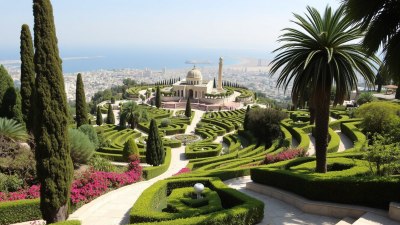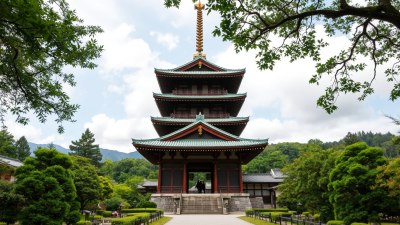The Baháʼí Gardens in Israel Grow on Sacred Patience
Explore the stunning Baháʼí Gardens in Israel, a symbol of faith, beauty, and devotion that reflects sacred patience.

Image created with Flux Schnell
The Baháʼí Gardens are not just a destination; they are a profound expression of faith and an architectural marvel that captivates the hearts of visitors from around the world. Located in Haifa, Israel, these terraced gardens ascend the slopes of Mount Carmel, offering breathtaking views of the surrounding landscape and the Mediterranean Sea. The garden complex is a UNESCO World Heritage site and is considered one of the most beautiful gardens in the world, attracting pilgrims and tourists alike.
A Symbol of Unity and Peace
At the heart of the Baháʼí faith lies a commitment to unity and peace, principles deeply embedded in the creation of the Baháʼí Gardens. Designed by the Baháʼí community, the gardens reflect the teachings of Bahá'u'lláh, the founder of the Baháʼí faith, who emphasized the oneness of humanity and the importance of harmony among different cultures and religions. The gardens, with their symmetrical designs and meticulously manicured flora, symbolize the beauty that arises when diverse elements come together in peace. The careful arrangement of plants and flowers, combined with the spiritual significance of the location, serves as a reminder of the potential for unity and understanding in the world.
Architectural Masterpiece
The design of the Baháʼí Gardens is an architectural feat, characterized by its terraced layout that draws the eye upward, symbolizing spiritual elevation. The gardens are divided into 19 terraces, representing the 19 occurrences of the word 'Bahá' in the sacred writings of the faith. Each terrace is adorned with a unique array of flowers, plants, and trees, meticulously chosen for their beauty and significance. The pathways are lined with intricate mosaics, and the central feature, the Shrine of the Báb, is a stunning blend of Doric, Ionic, and Corinthian styles, standing majestically at the top of the gardens.
The Role of Patience in Cultivation
The cultivation of the Baháʼí Gardens is a testament to the sacred patience that underpins the Baháʼí faith. The planning and implementation of the gardens took over 50 years, revealing the importance of long-term vision and dedication in their creation. Just as it takes time for plants to grow and flourish, so too does it take time for the ideals of peace and unity to manifest in society. The ongoing care and maintenance of the gardens are a continuous reminder that patience is a virtue, not only in gardening but also in life. The Baháʼí teachings encourage followers to be patient and resilient in pursuing their spiritual and communal goals, reflecting the slow yet certain progress toward achieving a harmonious world.
Spiritual Significance of the Gardens
The Baháʼí Gardens serve as a place of reflection and connection with the divine. Visitors often experience a sense of tranquility and spiritual rejuvenation as they wander through the lush pathways, surrounded by the beauty of nature and the harmonious design of the gardens. The gardens are not merely a visual experience; they are an invitation to engage in contemplation and introspection. The rhythmic patterns of the garden’s layout echo the balance of nature and the soul's journey, inviting a deeper understanding of one’s place in the universe.
Environmental Stewardship
In addition to their aesthetic and spiritual dimensions, the Baháʼí Gardens exemplify principles of environmental stewardship. The landscaping incorporates a variety of native plants that require minimal water and maintenance, reflecting the Baháʼí commitment to sustainability and respect for the environment. The gardens are an act of reverence towards nature, demonstrating how human creativity can harmonize with the environment rather than dominate it. This approach to gardening aligns with broader Baháʼí teachings that respect the Earth and promote the responsible use of natural resources.
A Place for Reflection and Pilgrimage
The Baháʼí Gardens hold immense significance for the members of the Baháʼí faith, and many undertake pilgrimages to Haifa as a manifestation of their devotion. The experience of walking through the gardens is seen as a journey towards spiritual enlightenment and a strengthening of one’s connection to God. Pilgrims often spend hours in meditation and prayer, finding solace amid flourishing greenery and the sound of fountains that dot the landscape. For many, the gardens are a sacred space that nurtures their spiritual growth and fosters a sense of community among Baháʼís from diverse backgrounds.
Cultural and Educational Activities
The Baháʼí Gardens also serve as a hub for cultural and educational activities. Regular events highlight the contributions of the Baháʼí community to society and promote the values of unity, justice, and peace. workshops, lectures, and art exhibitions are often organized to engage the public in discussions about the importance of these ideals in today's world. The gardens become a backdrop for fostering dialogue and understanding among different cultures, exemplifying the Baháʼí commitment to building bridges across divides.
Impact on Tourism and Local Economy
The Baháʼí Gardens significantly impact tourism in Haifa and the surrounding region. As one of the main attractions in Israel, they draw hundreds of thousands of visitors each year, contributing to the local economy and fostering intercultural exchange. The influx of tourists supports local businesses, including restaurants, hotels, and shops, creating opportunities for economic growth. Furthermore, the Baháʼí Gardens highlight the potential for tourism to facilitate understanding and appreciation of varied cultural identities, enriching the local community while honoring the legacy of the Baháʼí faith.
Challenges and Future Aspirations
While the Baháʼí Gardens are a symbol of beauty and faith, they are not without their challenges. Environmental changes, tourism pressures, and the need for ongoing maintenance pose hurdles that the Baháʼí community must navigate to preserve this sacred site. The community remains committed to the ideals that inspired the gardens, aiming to adapt and respond responsibly to these challenges. Future aspirations include expanding educational programs and increasing outreach to foster greater awareness of the Baháʼí teachings in a broad societal context. Ultimately, the Baháʼí Gardens stand as a testament to the enduring patience and dedication required to cultivate beauty, peace, and understanding in the world.
A Personal Journey Through the Gardens
Visitors to the Baháʼí Gardens often report transformative experiences that deepen their understanding of their spiritual path. Each step among the terraces provides an opportunity for self-reflection, an invitation to pause and consider one’s relationship with family, community, and the wider world. Many leave the gardens feeling renewed and inspired to bring the principles of unity and love into their daily lives. This personal journey reflects the broader essence of the Baháʼí teachings—that every individual has a role in contributing to a more just and peaceful world.
A Legacy of Sacred Patience
The Baháʼí Gardens in Israel are more than a stunning visual display; they embody a philosophy of patience, reflection, and unity that resonates deeply with visitors. Through the years, the gardens have become a symbol of hope, beauty, and the spiritual aspirations of humanity. Every plant and pathway tells a story of devotion and commitment to the ideals of peace and community, encouraging all who visit to embrace the lessons of patience. As the gardens continue to bloom, they stand as a reminder of the interconnectedness of all life and the collective journey towards a more harmonious existence.











